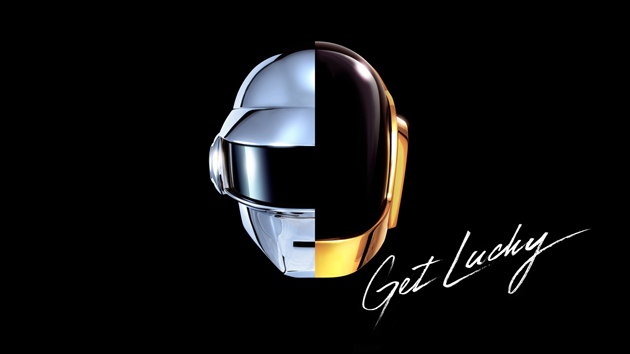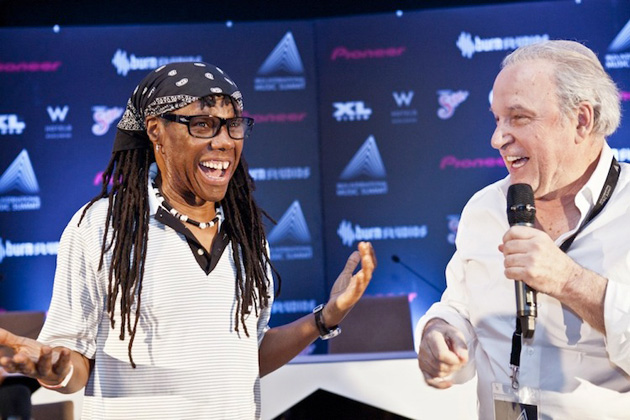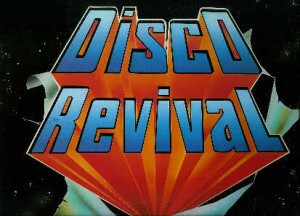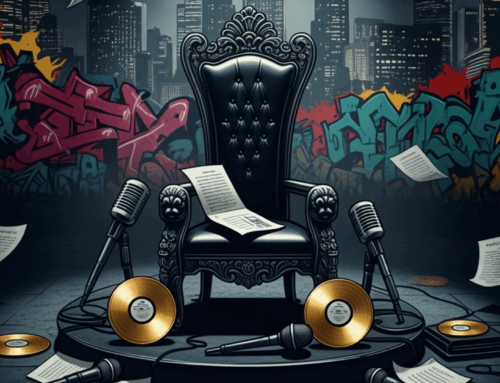 By now, you’ve heard Daft Punk’s “Get Lucky,” the initial single from their first studio album since 2005. With its slowed down tempo, upbeat character, and prominent guitar groove, “Get Lucky” – and Daft Punk’s upcoming album Random Access Memories, out May 21 in the U.S. – has served as a potential genre-definitive track – perhaps undeserved, but within high-profile electronic music, “Get Lucky” comes out of nowhere, a laidback take to the fast-paced, nearly maniacal frenzy surrounding modern house and dubstep’s cacophony.
By now, you’ve heard Daft Punk’s “Get Lucky,” the initial single from their first studio album since 2005. With its slowed down tempo, upbeat character, and prominent guitar groove, “Get Lucky” – and Daft Punk’s upcoming album Random Access Memories, out May 21 in the U.S. – has served as a potential genre-definitive track – perhaps undeserved, but within high-profile electronic music, “Get Lucky” comes out of nowhere, a laidback take to the fast-paced, nearly maniacal frenzy surrounding modern house and dubstep’s cacophony.
Mixmag’s Duncan Dick, in a review of Random Access Memories, positions the album as a game-changer for dance music, one reflecting Thomas Bangalter’s statement to Rolling Stone: “
“It’s as if they are trying to turn the clock back to a time not only before EDM but before even acid house,” Dick wrote. “This isn’t Daft Punk trying to get back to the warehouse or the rave but back to the nightclub and the discothèque.”
He goes onto say, “Could it be a deliberate attempt by the robots to alienate the fratboys, to discover whether the slogan T-shirted masses that pack out the big EDM shows are just another incarnation of the mobs that once burned disco records as ‘faggy’?”
Yet, Dick further points out that, even going against the grain, Daft Punk influenced many of the top EDM performers, from sounds to stage setups.
Along with DJs and producers like Fatboy Slim stating,”I’m glad Daft Punk have given us all a kick up the arse,” over a single song and album few have heard, “Get Lucky” is setting records. As The Guardian points out, “Get Lucky” rose to No. 3 on the U.K. singles chart just after 24 hours and, in the U.S. and U.K., became the most-streamed track on Spotify in the platform’s five years of existence.
Compounding to Dick’s assertion, “Get Lucky” symbolizes a return to disco, tying together elements that sporadically occurred over the past two years in pop and mainstream EDM.
It’s hard to determine when and if disco truly died. In the United States, 1979’s Disco Demolition Night in Chicago symbolized the genre’s end, but on the other side of the pond, disco mutated into synthpop, its slickness subverted for a post-punk aesthetic and quintessential strings and horns replaced with more experimental and percussive textures and rhythms.
But the pioneers of the time have all gone soft. The Pet Shop Boys traded beats for ballads on last year’s Elysium, while Depeche Mode’s last two albums, Sounds of the Universe and Delta Machine, were both soporific affairs with songwriter Martin Gore officially surrendering his ‘80s kink of “Master and Servant” and “Strangelove” for religiously-ambiguous salvation. And New Order, even playing at Ultra in 2012, seems to have forgotten about their genre-pushing, disco-meets-doom splicing in “Blue Monday” and “The Perfect Kiss.”
The late 1990s, as you can recall, brought out ABBA tribute group the A*Teens, who were more pop, 1970s-in-the-1990s-revivalist kitsch than a serious effort.
And, so, Daft Punk seems poised to bring in a new era of music, the leader of trends ranging from greater interest in disco’s creators to pop stars having an affinity for retro sounds.
Renewed Interest in Giorgio Moroder and Nile Rodgers
In a sense, Donna Summer’s death last year renewed interest in the genre, albeit briefly. Perhaps as a nostalgic factor, radio play and sales of Summer’s still-available albums skyrocketed, while long-time collaborator Giorgio Moroder was thrust into the spotlight simultaneously.
Last June, Moroder spoke about recording a spoken-word verse for Daft Punk and expressed interest in recording with Nicki Minaj and Rihanna. Although the latter hasn’t happened yet, a Billboard profile detailed the “I Feel Love” producer getting swept up by the modern EDM wave – specifically, getting offers to DJ gigs, as, after all, that’s what dance music producers seem to do these days, speaking at the International Music Summit in Ibiza and the Red Bull Music Academy, and recording Avicii’s first full-length album, which Nile Rodgers is also involved with.

If Daft Punk’s Random Access Memories, with both Moroder and Rodgers on board, could forward this disco revival, Avicii equally has potential to do so. When Rodgers, who worked to give Adam Lambert’s sophomore album a more dance-influenced sound, spoke at the International Dance Music Awards about recording with Avicii, he compared to Swedish producer to Herbie Hancock and Mick Jagger.
But, considering the debacle that was Avicii’s second set at Ultra 2013 (really, live country and soul?) and genre-spanning vision with Mike Einzinger of Incubus, Linkin Park’s Mike Shinoda, and Mac Davis also on board, Avicii could quash any expansion into mainstream EDM simply by creating a product that alienates listeners.
Nevertheless, even if the disco-country-soul-house fusion that seems to be Avicii’s vision doesn’t pan out, Moroder and Rodgers both have hope for the ‘70s genre and have already experienced greater exposure as a result of renewed interest. “It’s time to have something new in the dance world,” Moroder said in eight-minute documentary The Creators Project. “I love disco, or dance anyway, this is like a step forward. They had to do something which is different — still dance, still electronic — but give that human touch back.”
“I feel, in a word, wonderful,” Rodgers said to The Observer about “Get Lucky.” “For it to come together in this fashion is just great. It’s like the summer of ’78 has been duplicated.”
Retro Enamored
Rodgers revealed in a Rolling Stone interview that Daft Punk went retro in more than sound – specifically, how Random Access Memories was recorded reflects practices that have been out of use for nearly a decade in dance music. While contemporaries and new producers do nearly everything on a computer, Rodgers mentioned Daft Punk recorded at New York’s Electric Lady studios, where Chic did their first single, with actual instruments. Rodgers said, “I feel like I’m working with people who grew up with me and feel it the same way we felt the vibe when we were creating this stuff. It’s like they went back to go forward.”
 But, as Spin pointed out in a review of “Get Lucky,” this retro sound, regardless of genre, has already emerged in mainstream pop — presently with Justin Timberlake, going through a career revival of his own and Lana Del Rey.
But, as Spin pointed out in a review of “Get Lucky,” this retro sound, regardless of genre, has already emerged in mainstream pop — presently with Justin Timberlake, going through a career revival of his own and Lana Del Rey.
While Del Rey does her 1960s shtick and Timberlake’s “Suit & Tie” has a timeless quality, like Frank Sinatra meets Motown and gets translated to the dance floor, disco crept in with Lady Gaga’s Born This Way back in 2011.
As cloying and derivative as that album now appears, “Marry The Night” was described by The Telegraph, as, “Meatloaf goes to the disco. A rolling piano tune gives way to pounding techno beats, handclaps and
funk.”
New York Daily News, meanwhile, discussed the electronic-influenced singer’s transformation from ‘80s pop on her debut to one reminiscent of the 1970s: “If ‘The Fame Monster’s’ musical significance was to bring back mid-to-late-’80s disco – a rare and daring move at the time – ‘Born This Way’ inches back to the late ’70s/early ’80s variety, a sound that’s now the norm.”
Like Avicii, Gaga has an album in the works, but ARTPOP’s direction – or, more specifically, which period of pop culture the singer decides to pull from – hasn’t been revealed yet.
Gaga’s contemporary Little Boots, meanwhile, has outright stated, in promoting her sophomore album Nocturnes, that a disco reemergence is imminent. Although latest single “Broken Record” sounds like an odd indie pop-Eurodance mashup, Hesketh and her band went for a roller disco-meets-rave theme with its video.
“It feels like maybe this year could be the year of disco—Daft Punk is coming back and working with Nile Rodgers and Giorgio Moroder, the two kings of disco,” she stated in a March Cosmopolitan interview. “Dance Pop is just huge and feels so derivative and unimaginative to me, and I know that space could be amazing and creative and pushing boundaries. I’m hoping that with Daft Punk coming back and working with the people they are, they will give dance a bit of a kick in the ass—save it from eating itself any further. There are some amazing pop songs out there, but for every great one there are five terrible ones. It’s a vicious cycle.”




